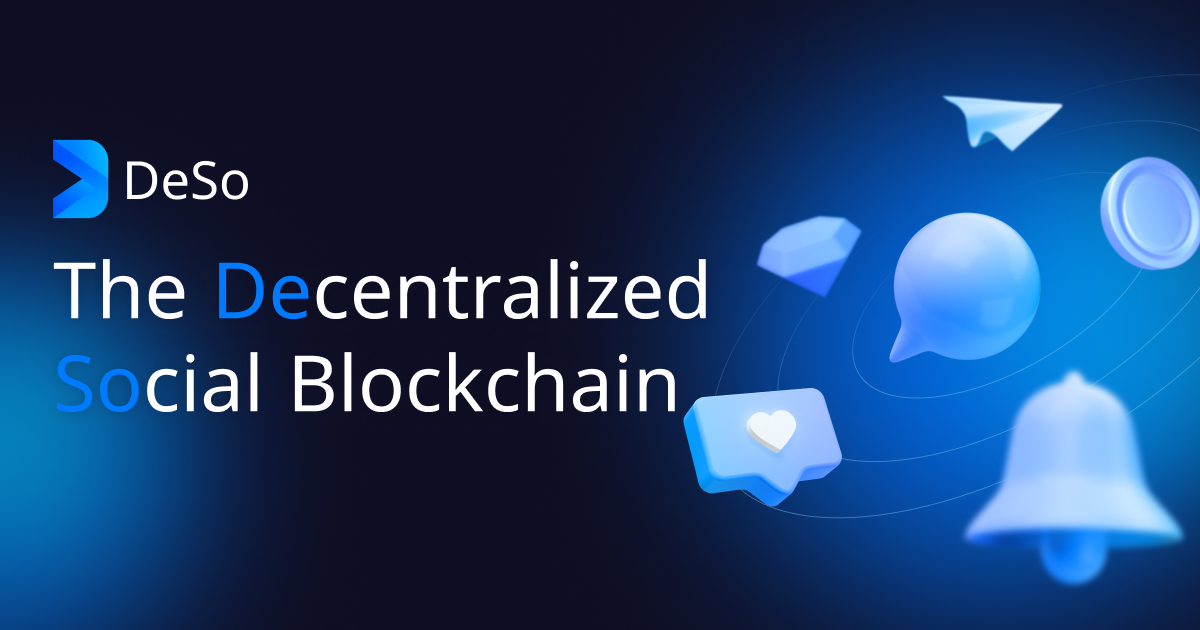
Decentralized Social (DeSo) is a layer-1 blockchain that empowers social media content creators and networks. The protocol was built to provide much-needed infrastructure to developers that seek to create decentralized social media applications. The goal of the project is to streamline the creation of DEXs, DAOs, and NFTs for these purposes.
Decentralized Social converts social media content into a digital asset. The protocol combines a variety of powerful social-oriented features and tools to accomplish this task. The system has seen considerable adoption since its launch in 2019. The network currently has +100 Dapps in operation. Some popular examples include Diamond, PolyGram, Cloutfeed, Pulse, and Supernovas.
What Problems Does Decentralized Social (DESO) Solve?
The development team behind Decentralized Social targeted some key issues faced by social media users and crypto enthusiasts. For one, the network helps to combat centralization. The social media sector is run by large firms that keep a tight grip on the discourse and communications of their users.
Decentralized Social eliminates centralization through its technical structure. The protocol stores all data on a decentralized ledger. This data is available to a large and growing network of independent third-party apps when needed. The developers see their protocol functioning much like DeFi applications on the Ethereum blockchain. Creators can pick and choose what features to incorporate into their networks.
Censorship
Whenever you have centralization and monopolistic behavior, censorship is sure to follow. The centralized social media platforms have grown increasingly brazen in their censorship activities. Today, you can get de-platformed simply for questioning the common narrative.
Decentralized Social provides a better alternative for users to consider. The network operates in a permissionless and censorship-resistant manner. There is no management or controlling group to monitor and block, ban, or prevent your posts. This open structure better represents the all-inclusive nature of DeFi (decentralized Finance). Network creators can integrate their own content control mechanisms to meet their needs.
Underpaid Content Creators
Content creators today are underpaid. There are creators with millions of followers that generate billions in profit for streaming platforms, yet they receive crumbs compared to their total value. Additionally, the nature of these platforms robs creators of control and creates under-engaged audiences. Decentralized Social introduces a creative suite of tools that helps these individuals monetize their content and connect with their followers in new ways.
Scalability Concerns
Since the earliest days of Bitcoin adoption, scalability concerns have been a hot topic. Both Ethereum and Bitcoin have had their networks ground to a halt due to these issues. Decentralized Social was built from day one to tackle this problem. The network can scale decentralized social applications to one billion users. Decentralized Social can handle hundreds of thousands of tps (transactions per second). Whereas, Ethereum, the world’s top-performing DeFi platform, can handle only 15 tps.
Benefits of Decentralized Social (DESO)
The benefits gained from integrating Decentralized Social into your creation process are immediately evident. Developers have more control and autonomy when programming on Decentralized Social. Additionally, the creation process is streamlined with lower costs. Anyone can create profiles and posts for DeSo applications to expand the ecosystem and improve the user experience.
Developer-Centric
One of the main draws for Decentralized Social is its developer-centric approach to blockchain. The protocol provides developers with significant cost savings on items such as data storage. For example, you can get 1 GB of on-chain storage on Decentralized Social for rates as low as 1 DeSo, the network’s native utility token.
Flexible
Decentralized Social is a flexible protocol that empowers developers in their creation methods and features. You can easily integrate traditional social features like creating profiles and posts. Also, developers can effortlessly add blockchain-native features to their apps including social tokens, tipping, and NFTs.
How Does Decentralized Social (DESO) Work?
Decentralized Social lives on the Ethereum blockchain but utilizes a different consensus mechanism that improves performance. Specifically, Decentralized Social leverages a PoS (Proof-of-Stake) protocol that provides users with the ability to stake their tokens and earn passive returns. Developers can set up new social networks and determine how they operate using this protocol.
Asset Creation
One of the core aspects of Decentralized Social is asset creation. New assets such as social tokens provide more earning opportunities for content creators and users. Additionally, the network supports NFTs (non-fungible tokens). NFTs can be used to provide scarce digital assets to users.
DeSo
DeSo is the native utility token for the Decentralized Social ecosystem. This token serves multiple roles. You need it to create new assets and tokens. It also powers smart contract executions and the creation of new blockchains. DeSo can operate as a cryptocurrency to facilitate p2p value transfers as well.
DeSo Foundation
The DeSo Foundation is the non-profit tasked with expanding the Decentralized Social network. The foundation provides both technical and financial help to developers. The group launched with a $200 million treasury to accomplish these tasks. Additionally, the group recently launched a $50 million developer fund called the Octane Fund.
History of Decentralized Social (DeSo)
Decentralized Social entered service in January 2019. The company’s founder, Nader Al-Naji, is no stranger to the tech industry. He had previously raised +$133 million to start an algorithmic stablecoin called Basis in 2017. He leveraged this experience and network to help create Decentralized Social.
Conclusion
Decentralized Social is a prime example of how decentralization can benefit an entire industry. The current social media market is filled with distrust and a lack of transparency. Decentralized Social provides the tools and network to eliminate these problems and improve profitability. As such, you can expect to hear more from this project in the coming weeks.


















